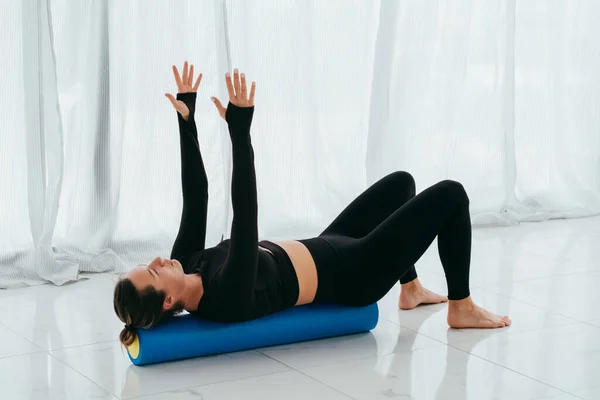Muscle stiffness—also sometimes referred to as muscle rigidity or muscle tightness—occurs when soreness, pain, or cramping causes your muscles to feel tight. These types of symptoms can result in difficulty moving, such as discomfort while stretching or walking.
Typically, when you experience stiffness, it will eventually go away on its own; however, it may be the sign of an underlying health condition. Muscle stiffness and tightness has a wide variety of causes, some of which are less serious than others. These causes include—but are not limited to—chronic fatigue syndrome, exercise, infections, and other conditions.
There are several different remedies that help prevent muscle stiffness and tightness. Making simple changes to your daily routine and incorporating regular exercise will reduce the likelihood of your symptoms returning. In order to minimize or avoid muscle stiffness, you should consider regular exercise, stretching, daily activity, and proper recovery time.
In more severe cases, you can also consult a physiotherapist to help identify the underlying conditions of your muscle spasms.
What are the common causes of muscle stiffness?
As mentioned, there are many possible causes for muscle stiffness or tightness. The severity differs between each cause and, should the symptoms persist, it is recommended that you visit a doctor.
Some common causes of muscle stiffness include:
Exercise
While exercise is an important element of any well-rounded lifestyle, it can sometimes result in muscle soreness. Whenever you try new exercises or increase the intensity of a workout, there’s a high chance that you will experience stiff, tight, or aching muscles afterwards.
Injuries
Muscles, tendons, and ligaments are most likely to experience soft tissue injuries. These may occur when you participate in sports, exercise, or even everyday activities. The extent of these injuries will vary case by case, along with the symptoms that occur.
Lupus
Recognized as an autoimmune disease, lupus impacts nearly every organ in the body. Included in the disease are flare-ups, causing symptoms to worsen. These are then followed by a period of remission where symptoms improve. The typical symptoms differ from one individual to another.
Lyme Disease
Transmitted to humans through ticks, lyme disease is recognized as the most common vector-borne disease. When left untreated, it can cause a wide variety of symptoms, including muscle aches and pains. Neck stiffness may also be expected depending on the severity.
Infectious Mononucleosis
Typically transmitted by teenagers, young adults, and college students, infectious mononucleosis may take a while to show symptoms. Muscle stiffness and aches are some of the primary symptoms. However, there are additional symptoms to look out for.
Polymyalgia Rheumatica
Occurring in individuals 50 or older, polymyalgia rheumatica is a common cause of stiffness and aching across the body. Anyone suffering from this condition is most likely to experience symptoms in their upper arms, lower back, thighs, and neck.
ADHD Medications
One side of some attention deficit hyperactivity disorder medications is muscle stiffness. Depending on the individual, certain medications, such as dexmethylphenidate, may result in severe muscle stiffness and pain.
Fibromyalgia
Although fibromyalgia is recognized for causing widespread pain throughout the body, it can cause a multitude of different problems. These may include:
- Fatigue
- Sleep difficulties
- Headache or migraine
- Anxiety
- Depression
- Cognition difficulties
- Tingling or numb hands and feet
- Pain in the jaw or face
- Digestive issues.
What conditions increase the risk of muscle stiffness?
Some pre-existing conditions can result in a higher risk of experiencing muscle stiffness or tightness, as well as pain. The longer these symptoms are left untreated, the more likely you are to also develop other risks.
Additional risks associated with muscle stiffness include:
- Arthritis: Typically resulting in joint inflammation, most people suffering from arthritis also experience stiffness and joint pain.
- Fibromyalgia: This is a recognized chronic illness that causes extensive musculoskeletal pain and fatigue.
- Tunnel Syndrome: This occurs when nerves get pinched or severely compressed, often resulting in stiffness and pain.
- Decreased Range of Motion: Tighter muscles can reduce the range of motion within your joints, typically making it difficult to perform everyday activities such as reaching, lifting, or bending.
Avoiding these different types of potential risks is incredibly important, especially if you are already at a higher chance of contracting them. Some preventative measures you can take to avoid muscle tightness and maintain flexibility and mobility include stretching, regular exercise, as well as practicing good posture.
Other steps you can take in order to prevent muscle stiffness involve:
- Warming up and down before and after exercise
- Wearing proper footwear while exercising
- Wearing warm clothes in cold weather
- Ensuring that your work and home furniture provide support and comfort
- Avoiding extended periods of inactivity
- Taking control of your diet plan.
It is recommended that whenever you experience symptoms of muscle stiffness, you contact a healthcare provider who can help determine the correct diagnosis and treatment plan.
What are the most effective treatments for muscle stiffness?
The different treatments for muscle stiffness will depend on the cause, overall diagnosis, and severity. There are several different options for reducing tight muscles and muscle tension, including the following:
- Stretching: Stretching has many benefits when it comes to preventing muscle stiffness, including lengthening tight muscles, improving flexibility, and reducing stiffness and discomfort.
- Massage: Massaging your muscles regularly can help minimize tightness and improve circulation, which in turn reduces cramps and soreness.
- Heat or cold therapy: Heat and cold application is a tried and true remedy for helping reduce muscle inflammation and discomfort.
- Exercise: In addition to reducing stiffness and pain in muscles, you also want to utilize exercise as a means for strengthening and stretching muscles, both prior to and after soreness has occurred.
- Over-the-counter pain medication: Inflammation and pain can be reduced through the use of non-steroidal anti-inflammatory drugs. These specific medications are also beneficial towards relieving muscle cramps and spasms.
- Physical therapy: Attending several physiotherapy sessions provides the necessary tools and support to develop an effective treatment plan. This plan may involve exercises, stretches, and other techniques designed to reduce muscle stiffness and discomfort that tight muscles and tension can cause.
How to Cope With Muscle Stiffness in the Long Term
Muscle stiffness and tightness can result from a wide variety of different causes. Your diagnosis may vary depending on the extent of your symptoms and specific cause.
Regularly implementing certain preventative measures, such as exercise, heat and cold therapy, pain medication, and physical therapy, can not only help reduce associated risks, but also minimize overall symptoms.
Physiotherapists are trained to identify the cause, support you through treatment, and develop a personalized plan that minimizes or even cures muscle stiffness and tightness.
AUTHOR’S BIO:
Erin Gregory is a blogger in Toronto. She is currently working as a Community Manager for several small businesses. She has graduated with honors from the University of British Columbia with a dual degree in Business Administration and Creative Writing. When not working, she eagerly shares her wealth of knowledge about all things health and business solutions. Erin’s unique insight and expertise makes for powerful content.








